
Local Leaders on a Global Stage
Governors Global Climate Summit
Los Angeles, California Sept. 30-Oct. 2, 2009
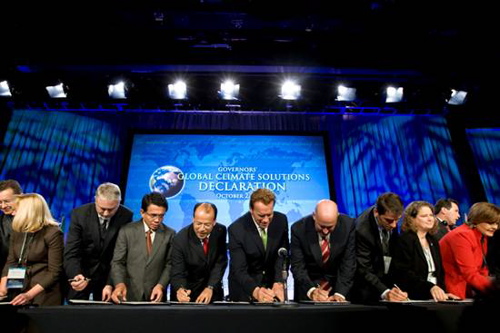
Governor Arnold Schwarzenegger joins global leaders in signing an agreement that recognizes the role of subnational governments in the discussions on the next global climate agreement.
See press release - 30 Global Leaders Sign Declaration In Advance of Next Climate Agreement http://gov.ca.gov/press-release/13457/
Cast of Characters: On the Road to Copenhagen
This year's Governors Climate Summit was a diverse collection of passionate leaders -- a convergence of private, public and NGOs who hope for a shared future -- who are on the road to Copenhagen -- to collaborate at a subnational level at creating policy and partnerships between activists, tribal leaders, city mayors, state governors, premieres, national agencies, non-governmental organizations and CEO's. These are just of few of the characters on the global stage whom I met - and who shared their stories of their paths on the road to Copenhagen.
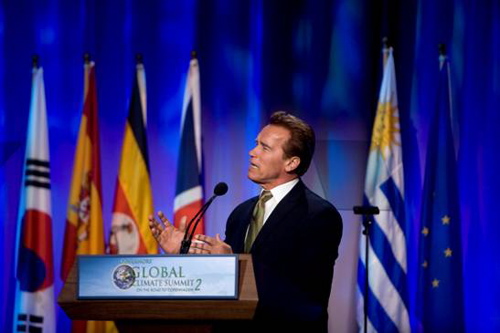
The second summit ... the sequel is going to
be better, it's going to be bigger and more
important than ever."
Arnold Schwarzenegger
Governor Arnold Schwarzenegger and United Nations officials welcomed more than 1,200 attendees from over 70 states, provinces, and countries to the Governors Global Climate Summit 2 http://gov.ca.gov/press-release/11082. As the largest gathering of regional leaders who are focused on climate solutions, this summit will help develop cooperative partnerships and promote the collaboration needed to reduce greenhouse gas emissions, build green economies and fight climate change. These efforts provide subnational leaders the opportunity to influence the position of their national governments in advance of negotiations for the next global agreement on climate change taking place in Copenhagen this December.
Governor Schwarzenegger said in his opening remarks, "this is going to be the second summit and the sequel is going to be better, it's going to be bigger and more important than ever. We have leaders here from more than 70 states, provinces, countries and island nations representing six of the world's seven continents: Australia, Asia, Africa, Europe, South America and North America. This is an unprecedented collaboration. It is an international conference of the highest level. Experts and leaders from around the world are here partnering and creating relationships that are the model for our nations. Together, we are calling on our national governments to recognize the support that we are giving, how critical of a role that we are actually playing in fighting global warming. So we are asking them, because the bottom line is that what we are doing is absolutely essential. Because while all those governments, the national governments, are debating over who should go first with the reductions, while they're debating what should the developing nations do, or the developed nations do... we on the regional level are already creating the action. That is right. We are creating the action."
See transcript of Governor Schwarzenegger delivering remarks at opening of Governors Global Climate Summit 2 http://www.articulate-sf.com/Gov_Conference/Transcript_GovSchwarzenegger_Opening_Governors_Global_Climate_Summit 2.pdf
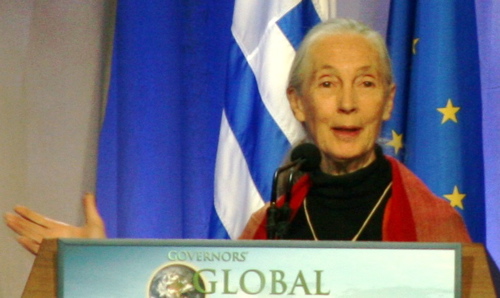
"Up in the north the ice is melting - what
would it take to melt the ice in the human heart?"
Jane Goodall
Jane Goodall opened with a simple 'hello' by calling into the conference ballroom the voice of the chimpanzee - the voice you here when you go out into the forests - the calls of the African forest.
Then she paraphrased her encounter with a group of indigenous people from 9 countries at the Millennium Peace Summit for religious and spiritual leaders -- with the leader of Inuit Nation of Greenland stating "My brothers and sisters I have message for you - Up in the north the ice is melting - what would it take to melt the ice in the human heart?
She is a woman of action - taking time out of her 300-day world travel schedule to address the Conference and sharing her passionate commitment to 1) control emissions of green house gases caused by human actions and 2) protect the great forests from deforestation - the forests that have the capacity to absorb carbon.
Ms. Goodall described several projects in which she is intimately involved, including the Jane Goodall Institute Take-Care program in Tanzania, Africa - providing women to start their own environmental and sustainable programs and introducing their youth program in 111 countries around the world for young people to learn how sitting in the trees and planting trees is so important to their own health. These programs are helping to preserve the forests and to re-forest the land.
Funds are provided through programs like REDD (Reduced Emissions from Deforestation and Degradation) whose mission it to provide funds to prevent deforestation - in other words put a value on the carbon that's in these forests - so people can benefit from saving rather than cutting it down and selling it.
Ms. Goodall also noted the recent announcement in the UK called the '10/10 Initiative' - a pledge to reduce carbon emissions by 10 percent by 2010.
How much is a tree worth?
What is a tree worth? What is the value of a forest? Is it more valuable as a timber harvest? - or as a cap-and-trade revenue from carbon offsets? How to assess the worth of a forest's timber and arable land, versus the rights of the indigenous community who depends upon it for cultural and economic survival, while simultaneously reducing CO2 emissions? To debate these questions a panel was convened @ UCLA's Center for Climate Change Solutions.
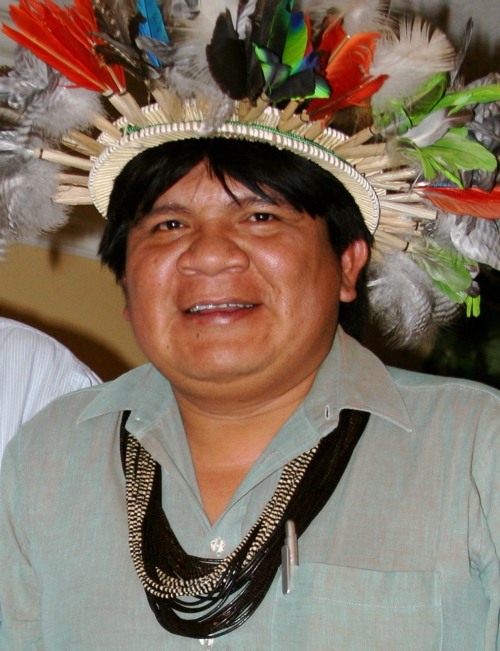
"We need the involvement of
Brazilian government to overcome
this - they should create awareness
that the forest is important"
Chief Almir Narayamoga - Surui Indigenous People
Chief Almir Narayamoga, tribal leader of the Surui Indigenous People of the Amazon territories, explained his perspective, "The general population - they don't understand the importance of the forest in their own lives - in our lives. This is why its necessary to overcome these difficulties. Even with our struggle to protect the territory - we still have invasions of our territories from loggers. We have partners, but its not enough to this implement this kind of model with just financial support. We have a lack of public policy, and recognition of this situation by the Brazilian government. We need government to recognize this kind of management of indigenous territories. We need the involvement of Brazilian government to overcome this - they should create awareness that the forest is important.
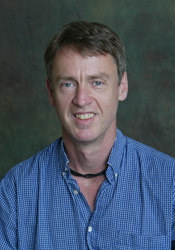
"I think it's particularly great to see
tropical governors and U.S. governors
with Governor Schwarzenegger calling
on presidents of their countries to move
on climate change and to do something
about forests. I think this is going to
make a big difference."
Steve Schwartzman - EDF
Steve Schwartzman of the Environmental Defense Fund, then explained the historical context of the Amazon rainforest deforestation issue: Steve explained, "Organizations in those Amazon social movements were really concerned when they discovered the Kyoto Protocol was created, and the Brazilian government and a bunch of the other governments and the big NGOs were all against including deforestation. They didn't want to create any kind of incentive for deforestation. So those organizations went out and engaged in a long, and often acrimonious, discussion with governments and NGOs and policymakers on this issue of how we can do something about deforestation and climate change. Initially, in the first moment, when the rules for the Kyoto Protocol were written, they lost, but that prompted a group of researchers led by a couple important Brazilian NGOs to put out a new concept trying to get to reopen the discussion of deforestation on a more positive basis. A very simple concept that said, look, if a whole country can reduce its national deforestation below some historical average and show that it's done that using cutting-edge remote-sensing technology, it should be able to get access to the carbon market and get carbon credit for that reduction."
Read full Steve Schwartzman interview
http://www.articulate-sf.com/Gov_Conference/Steve_Schwartzman_transcript.pdf
Read Press Release - Governors Urge Their Presidents to Include Forest Protection in Climate Change Policies
http://www.prnewswire.com/news-releases/us-brazilian-and-indonesian-governors-urge-their-presidents-to-include-forest-protection-in-climate-change-policies-63275567.html
Trickle-Up ... Trickle-Down
Joel Makower, chair of Friday's morning panel National and Subnational Cooperation: Paving the Way, said it best, "It's at the subnational level that the hard work is done by governors, mayors and tribal leaders -- national leaders can learn from states and provinces -- this is where innovation takes place, policies, technologies and solutions for natural resources, cultures, eco-systems and institutions -- this is where powerful partnerships between local and national governments partnered with non-governmental organizations across international borders can accomplish things that national governments cannot do. So for climate policy, it's both trickle-up -- and trickle-down -- we look to our national leaders for vision and direction -- but they look to us for on-demand solutions. It's these international challenges like climate change -- that's when the best and brightest reveal themselves (on the panel).
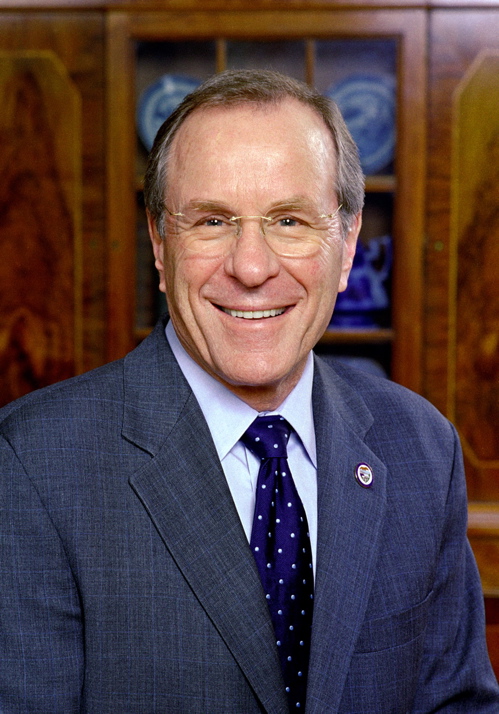
"Recognizing that you need national,
international agreements with the action
that's taken at the sub-national level at states,
counties and cities and local governments are
really where this is all going to take place"
Ted Kulongoski, Governor of Oregon
Among the panel was Ted Kulongoski, Governor of Oregon. I asked the Governor to explain a subnational partnership that exists today that addresses climate change policy. He said, "I was one of the original governors of what is now the Western Climate Initiative. It was with Governor Gary Locke from Washington and Governor Gray Davis, at that time, from California, and we met in San Francisco and formed the first group that were three states and that has grown into the Western Climate Initiative. So, it is a collaboration of eight states and we're about four or five different provinces in Canada that actually allow us to work together. So we have been working together nationally between the region here in America and out in Canada and it's actually - those are just the ones that are actually in the system. The other ones, there are a number of states in other provinces and even Mexico has overseers that come and participate. So, we're working at all levels of government to be able to get people together to actually address these issues."
Read full Ted Kulongoski interview.
http://www.articulate-sf.com/Gov_Conference/Ted_Kulongoski_transcript.pdf
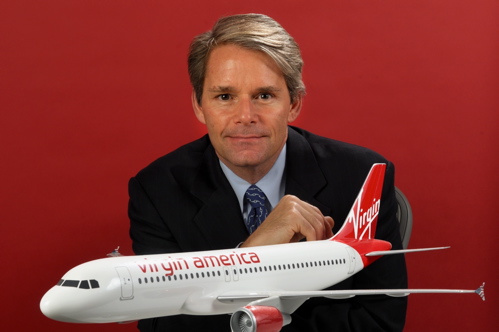
"The bottom-line is...we're pumping harmful things
into the atmosphere while we're waiting on a global
solution...if Cap-and-Trade is good enough for utilities,
it's good enough for automobiles, and oil companies
and everyone else, it ought to be good enough for us.
And that's really what we're saying."
Dave Cush - CEO Virgin America
Aviation Cap-and-Trade?
Dave Cush, CEO of Virgin America, wants to include aviation in Cap-and-Trade legislation. He stated, "We don't want to be the poster child of a dirty industry, while we search for cleaner fuel... our belief is, whatever Cap-and-Trade legislation is ultimately approved in Washington, we want the airlines included. And right now the domestic industry is saying, "We want to be excluded." And that they want a global solution of this rather than a local solution. Currently VA is convening leaders across public and private sectors to voice their opinion on Cap-and-Trade and High Speed Rail.
Today, passengers can offset their flight using VA Red interactive system. All offsets are managed by carbon fund and are validated by EDF.
See Virgin America Press Release on Emissions http://www.virginamerica.com/va/press/2009/Apr/Virgin_america_First_US_Airline_to_Join_the_Climate_Registry.html
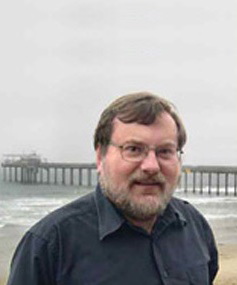
"Oceans are the main actor although you
wouldn't know it from publicity. Oceans are
the main reservoir of heat...it's the best proof
that global warming is happening over the last
50 years ...that we've heated up the top half mile
of ocean. 71% of earth is ocean...this is an awesome
amount of heat. It's kind of scary. Frankly we're
worried about Global Warming."
Tony Haymet - Scripps Institution of Oceanography
The Ocean's Governor
Tony Haymet of Scripps Institution of Oceanography agrees with the focus on deforestation. "It's probably right that we focus on deforestation - that's 30% of CO2 we emit into the atmosphere... nobody is ever elected to look after the Oceans. That's why Oceans are a sleeper issue. Yet Oceans are the main actor although you wouldn't know it from publicity... oceans are the main reservoir of heat...it's the best proof that global warming is happening over last 50 years ...we've heated up the top half mile of ocean - 71% of earth is ocean...this is an awesome amount of heat. It's kind of scary. Frankly we're worried about Global Warming."
Tony also emphasized collaborations that are taking place between private and public organizations, including research on Algae BioFuels, a liquid transportation fuel. San Diego, with its ideal climate and geography, has become a center for this collaborative research with public organizations, including Scripps and private companies such as Synthetic Genomics' biofuel research and the development agreement with ExxonMobil Research &Engineering, Sapphire Energy and General Atomics. They have created a regional consortium, the San Diego Center for Algae-based BioFuels (SDCAB), a premier public/private partnership dedicated to the advancement of algae-based biofuels research to imitate Bio Tech Movement, to compete and simultaneously share communal facilities. The Goal is Zero Carbon Fuel.
Read full Tony Haymet Interview
http://www.articulate-sf.com/Gov_Conference/Tony_Haymet_transcript.pdf
The Governor summarized the goal of the three-day conference: "We also know that the change ahead is big. I mean, the challenges are big. It's like pushing, in a way, a rock or a boulder up to the hill. And you know that alone you cannot push that, so you need people to come on board and to keep pushing and pushing. But you know that as you push that, when you get up there with this boulder on top of that hill, on the other side it rolls down and it will gain momentum. And that's exactly the way it will happen with the environmental movement, fighting global warming. There is no one that can push that rock alone. None of us can solve the global warming alone. But together we can and together we will. Together we will usher a new era and launch a green revolution all around the world. So let's roll up our sleeves and get to work."
Taking Action!
Below are just a few of the resulting press release initiatives and agreements that resulted from the summit:
30 Global Leaders Sign Declaration In Advance of Next Climate Agreement http://gov.ca.gov/press-release/13457/
Governors Urge Their Presidents to Include Forest Protection in Climate Change Policies
http://www.prnewswire.com/news-releases/us-brazilian-and-indonesian-governors-urge-their-presidents-to-include-forest-protection-in-climate-change-policies-63275567.html
Governor Schwarzenegger Announces Partnership with Jiangsu Province of China to Advance Climate Policies
http://gov.ca.gov/press-release/13456/
Governor Schwarzenegger Issues Statement on Creation of Nation's Largest Carbon Sequestration Project
http://gov.ca.gov/press-release/13427/
New EPA Rule Will Require Use of Best Technologies to Reduce Greenhouse Gases from Large Facilities/Small businesses and farms exempt
http://yosemite.epa.gov/opa/admpress.nsf/d0cf6618525a9efb85257359003fb69d/21acdba8fd5126a88525764100798aad!OpenDocument